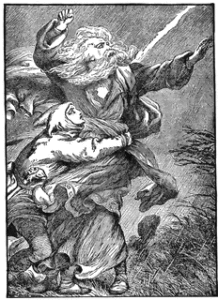So the other day I saw a post on the Shakespeare section of Reddit that mentioned a King Lear rap. Which happens. Later that day I got an email about a King Lear rap. Which also happens, as people trying to promote their original content will google for Shakespeare blogs and I’m usually somewhere on that list. Then I saw that the name on the rap (and the email) was MC Lars.
Hey, I thought. I know that name.
MC Lars (real name Andrew Nielsen) is a “lit-hop” rapper who has opened for Snoop Dogg and worked with Weird Al Yankovic (among many, many others). He’s also written songs about Ophelia, Macbeth, Edgar Allen Poe, Moby Dick, and now, King Lear.
I wrote back and told him, “Sure I can share the link around, but while I’ve got you here can I ask you a few questions?” He said sure.
So, first things first!
Oh, and did I mention he’s also got a TEDx talk on the subject of hip-hop and Shakespeare?
So the way this worked is that I sent him some questions via email, and he sent back his answers. Both my questions and his answers have been edited. Any misrepresentation of intent is entirely unintentional, I am editing only for length and clarity.
SG: If I hadn’t done enough research I would have used the term nerdcore to describe you, but from what I’ve learned lit-hop is the better term. Can you tell us more about how you prefer to be presented?
MC Lars: While rapping about Shakespeare is indeed nerdy, “nerdcore” has always been MC Frontalot’s invention, which is why I’ve opted to let him own the genre. While I would agree that my Game of Thronesand Star Wars raps could potentially fall under the nerdcore genre, “lit-hop” (a term coined by Canada’s amazing rapper Baba Brinkman) better describes the literary songs I’ve been releasing. semantically speaking. I started using Brinkman’s term in 2012 when I released by Edgar Allan Poe EP.
SG: When I think hip-hop and Shakespeare I think of that TEDx talk by Akala. Is there a relationship between your work and his?
MC Lars: I wrote my first Shakespeare rap in 1998, but I doubt if Akala ever heard it. He is truly awesome, though! After my TEDx came out, lots of people tweeted me to check out his, which I did and really enjoyed. Looking at the YouTube timestamps, it looks like he debuted his TED Talk a few months before mine. I would love to meet him one day.
SG: “Hey There Ophelia” came out in 2009 (and I admit I assumed it was just a cover of the Lumineers’ song, I did not make the connection). How come we’ve had to wait eight years for you to come back to Shakespeare?
MC Lars: I wrote “Hey There Ophelia” in 2007; the song’s title is a play on the Plain White T’s song “Hey There Delilah” which was a big hit back then. I always wanted to crowdfund a Shakespeare album and series of videos, but the time never seemed right. I did Poe in 2012 and this year it was my goal to launch a Series of Shakespeare ones. My next one is about his sonnets.
SG: I’ve noticed that you tend to find a hook and repeat. Do you feel that’s the essence of the hip-hop style? Or is there not enough meat on the bones to get more verses out of the original content? Do you think that your audience doesn’t have the interest or attention span to get more details from the story?
MC Lars: The idea of repeating phrases is more of a “pop song” thing that rap emulates in a simple way. I always try to leave the audience with a repeating line. “King Lear, King Lear” is a lot shorter than “Hey There Ophelia”; in the past decade, people’s attention spans have gotten even shorter. I think you really only have 45 to 90 seconds to get people’s attention! I would have loved to rap more about Edmund and Edgar’s relationship in my “King Lear, King Lear” song – maybe I’ll do a sequel.
SG: Have you had people come up to you who want to dissect your interpretation of Shakespeare? I’m personally of the belief that more Shakespeare is better, and whatever I can get into people’s heads, the better, even if it is sometimes a gloss of the details.
MC Lars: Academics do enjoy analyzing my literary raps, which I love, letting me know when I’m off the mark. I learn a lot from them though, I once tweeted about existential and family comparisons between Hamlet and Antigone and people were quick to point out that it was a stretch. My audience is smart, which means I can’t be sloppy!!
SG: Ok, let’s talk about King Lear. Shakespeare’s Mt. Everest. Why pick that one? Do you think that your audience, in general, knows the story already? I’ve often argued that King Lear, in particular, is a play that you can’t really understand until you’ve lived your whole life, and I’m amazed when high schools try to get teenagers to read it. Why not go with a Romeo and Juliet or A Midsummer Night’s Dream, are you avoiding those deliberately because they’ve been done to death?
MC Lars: I did a term abroad at Corpus Christi in Oxford sophomore year and Lear was the first piece we studied, so it has a special place in my literary memory. But, honestly, of all of the demos I did for this new YouTube series, my Lear song was my favorite. I do love your point, in the fifteen years since I first was introduced to Lear I understand it now more… the betrayal of youth and greediness becomes more scandalous with age! It’s more of a nightmare imagining going mad and losing everything. That’s an interesting analysis which I appreciate.
SG: Finally, any words of advice for kids out there like my son who dream of being a social media sensation?
MC Lars: I think the key is persistence – sometimes I get disappointed when things I produce don’t get an instant reaction. I think the only formula is you need to do anything consistently – like multiple times a month – for a year. If your social media numbers don’t go up, it’s time to rethink it. I went through a period for a few years where my focus was trying to hit something mainstream by writing about things like Rick and Morty or Game of Thrones, but then it began clear that I couldn’t offer much more interpretation? My main projects now are doing pop culture Patreon songs to help pay the rent and then these literary rap videos, in addition to ICP history videos (that’s another long story, but something that inspired me to start rapping back int he 90s). I am going to keep at it for a year and see what happens. I think that it’s tempting to want instantaneous recognition for something, but I think the advice would be to tell your son to keep working at something and give everything a year. It’s not easy with everyone’s access to the internet for cultural expression / edification, but, ironically, those who are persistent stick around and make an impact.
Thanks to MC Lars for his time! If you’ve got questions that I didn’t think to ask, first, where were you on Twitter when I put out the request? 🙂 And second, go ahead and ask them in the comments – he might stick around and keep answering!
 With Easter approaching, what do you say we go hunting for eggs in Shakespeare’s work? I’m not going to list them all here (since it’s easy to hunt them down with a search engine where’s the fun in that?) but I’ll hit the most famous ones. Add more in the comments!
With Easter approaching, what do you say we go hunting for eggs in Shakespeare’s work? I’m not going to list them all here (since it’s easy to hunt them down with a search engine where’s the fun in that?) but I’ll hit the most famous ones. Add more in the comments!
 So I’ve got driving duty this weekend for my daughter’s volleyball practice. Scene : A Honda Pilot with four 16yr old girls jammed into it. They are discussing the recent walkout, how it went with various teachers, etc… and one of them clearly says “…we were listening to Macbeth and we just left.”
So I’ve got driving duty this weekend for my daughter’s volleyball practice. Scene : A Honda Pilot with four 16yr old girls jammed into it. They are discussing the recent walkout, how it went with various teachers, etc… and one of them clearly says “…we were listening to Macbeth and we just left.”
